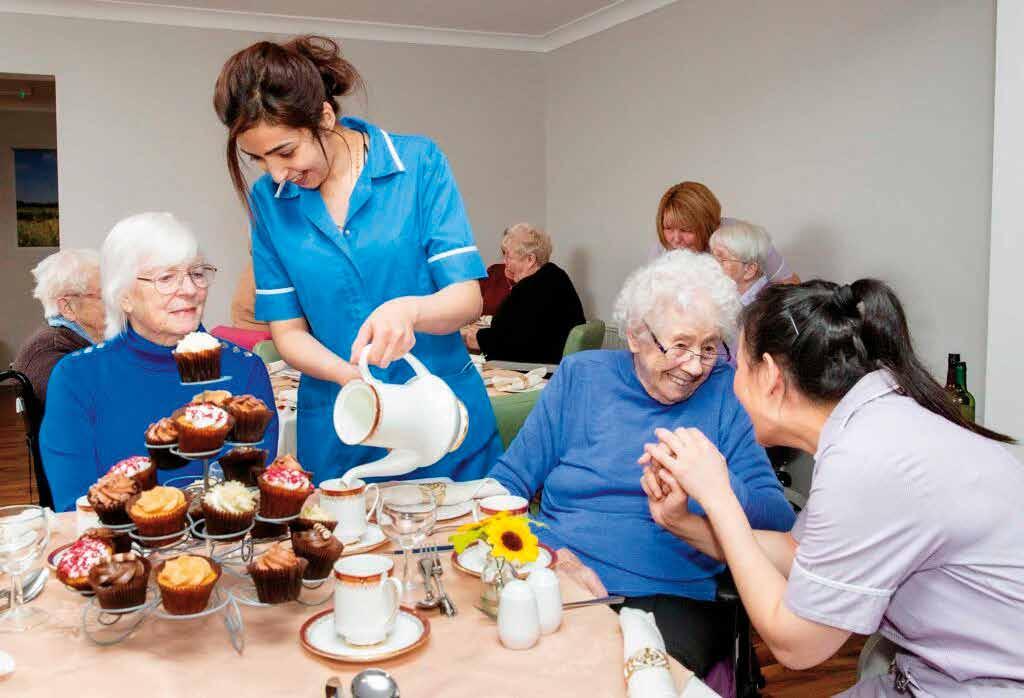
8 minute read
Luxury Nursing, Residential & Dementia Care in North & West Yorkshire
Spellman Care is a family-run business which has been operating nursing and residential homes in the local area for over 30 years

All four of our homes have dedicated Dementia Care communities, and use recollections, reminiscence, and sensory-based activities to gain an insight into an individual's life stories. Getting to know our residents is the key to our person-centred approach to care.
We offer a varied calendar of activities ranging from musical entertainment, arts and crafts, table games and coffee mornings, along with seasonal events and entertainment.
We are proud that all four homes in our group have been rated 'Good' by the Care Quality Commission (CQC)
9.8 Tel: 01756 700994 Tel: 01943 870720 Tel: 01535 282424 Tel: 01535 656124
We suggest that you take paper with you when visiting care homes so that you can make notes. You can download and print this checklist at: www.carechoices.co.uk/checklists
Staff
What is the minimum number of staff that are available at any time?
Are staff respectful, friendly and polite?
Do staff have formal training?
Are the staff engaging with residents?

Activities
Can you get involved in activities you enjoy?
Is there an activities co-ordinator?
Does the home organise any outings?
Are residents escorted to appointments?
Do the residents seem entertained?
Does the home have a varied activities schedule?
Life in the home
Is the home adapted to suit your needs?
Can you bring your own furniture?
Are there enough plug sockets in the rooms?
Are there restrictions on going out?
Is there public transport nearby?
Does the home provide any transport?
Can you make/receive calls privately?
Can you decide when to get up and go to bed?
Does the home allow pets?
Does the home use Digital Care Planning accessible to families?
Personal preferences
Is the home too hot/cold? Can you control the heating in your room?
Is the décor to your taste?
Are there restricted visiting hours?
Is there somewhere you can go to be alone?
Does the home feel welcoming?
Catering
Can the home cater for any dietary requirements you may have?
Does the menu change regularly?
Can you eat when you like, even at night?
Can you have food in your room?
Is there a choice of food at mealtimes?
Is alcohol available/allowed if you want it?
Can visitors join you for meals?
Fees
Do your fees cover all of the services and activities?
Are fees likely to change regularly?
Is the notice period for cancellation of the contract reasonable?
Could you have a trial period?
Can you keep your room if you go into hospital?
Can you handle your own money?
*See page 78.
Caring for your family
Rosedale Care residents are supported to live an active and fulfilled life in a homely setting. Our ensuite bedrooms are furnished to a high standard offering Residents the chance to enjoy comfort and tranquillity. Rosedale’s person-centred care ethos puts resident’s health and wellbeing central to everything providing a truly holistic care package.
Maple Court
Tel: 01723 413413
Email: info@maplecourt.co.uk
182 Barrowcliff Road, Scarborough, YO12 6EY
Crystal Court
Tel: 01423 810627
Email: info@crystalcourt.co.uk
Pannal Green Pannal, Harrogate HG3 1LH
Sutton Hall & Lodge
Tel: 01535 635329
Email: info@suttoncare.co.uk
Corn Mill Walk, Sutton-in-Craven, Keighley, BD20 7EN
“This is a very welcoming home. The staff are kind, caring and supportive. The food is fantastic, and we are given lots of choices. My bedroom is lovely, and I have been able to furnish it to my taste. The management are always on hand for a chat and always listen to me and my family. The activities are excellent and I am spoilt for choice with the schedule. I am extremely happy here !”

Sutton Hall Resident
We suggest that you take paper with you when visiting care homes so that you can make notes. Please use this checklist in conjunction with the care homes checklist on page 73. You can download and print this checklist at: www.carechoices.co.uk/checklists
Design
Are there clear signs throughout the home?
Has the home been designed or adapted for people with dementia?
Are the home and grounds secure?
Are there prompts outside the residents’ rooms to help people identify their own?
Is the décor familiar to your loved one?
Choices
Do residents get a choice in terms of what they wear each day?
Are residents encouraged to be independent?
Can residents decide what to do each day?
Can residents have a say in the décor of their room?
Activities
Are residents able to join in with household tasks like folding washing?
Are there activities on each day?
Can residents walk around outside on their own?
Are residents sitting in front of the TV or are they active and engaged?
Are there rummage boxes around?
*See page 78.
Health
Can residents get help with eating and drinking?
How often does the home review residents’ medication?
Does the home offer help if a resident needs assistance taking medication?
Do GPs visit the home regularly?
Staff
Are staff trained to identify when a resident might be unwell?
Are staff trained to spot when someone needs to go to the toilet?
Do the staff have any dementia-specific training/experience?
Will your loved one have a member of staff specifically responsible for their care?
Approach to care
Does the home follow a specific approach to dementia therapy, for example, validation therapy?
Will the home keep you informed about changes to your loved one’s care?
Does the home have a specific approach to end of life care?
Does the home keep up to date with best practice in dementia care?
Disclosure and Barring Service (DBS)
The DBS provides a joined-up, seamless service combining the criminal records checking and barring functions.
The DBS can bar a person unsuitable to work with vulnerable people, including children, from working in regulated activity in the future. If a person is barred, it becomes an offence for an organisation to knowingly engage that person in regulated activity.
Employers and volunteer managers of people working in ‘regulated activity’ have a legal duty to make referrals to the DBS in certain circumstances.
Advocacy
Advocacy services help people to speak for themselves. They offer a confidential, free and independent service provided by trained advocates. Sometimes, you may need an independent advocate to help and support you through a difficult time in your life, or to support you if you feel you are not getting the services or help you need. The type of advocacy service you may receive will depend on your needs and circumstances.
In accordance with the Care Act 2014, local authorities must arrange an independent advocate to support you to be involved in the assessment process, in making your care and support plan, and in the safeguarding process if you meet both of the
The local authority also has the power to make a referral and should do so where it is necessary.
Regulated activity is work – both paid and unpaid –with children or vulnerable adults that meets certain criteria.
The full up-to-date guidance and definitions must be referred to when deciding whether to make a DBS referral.
For disclosure information and services, visit the DBS homepage: www.gov.uk/dbs following criteria:
• You would have substantial difficulty in being fully involved in these processes.
• There is no appropriate individual available to support and represent your wishes. This person cannot be involved in your care and support in a paid capacity and must be appropriately trained and supported to fulfil this role.
If you meet the above criteria, a referral will be made to our Independent Advocacy Service –Cloverleaf Advocacy. There are two specialist advocacy services in North Yorkshire that you may wish to contact directly – see page 9 .
Making a comment, compliment or complaint about care services
If you use a home care agency or move into a care home, you should feel able to comment on any aspect of your life which affects your happiness or comfort. This might be anything from the way you are treated by staff to the quality of the food you are served. You should also feel free to make suggestions about possible improvements to your surroundings and the services provided.
Making a comment, compliment or complaint should not be made difficult for you and should not affect the standard of care that you receive, whether in your own home or in a care home or care home with nursing. Care services are required under national Essential Standards of Quality and Safety to have a simple and easy-to-use complaints procedure.
A friend or relative can make a comment on your behalf if we have your agreement to the complaint being made and you give consent for us to share your information with them. Or you can ask someone, for example an independent advocate, to support you to make the complaint yourself.
If you are concerned about the care that you, a friend or a relative are receiving, you should contact the registered manager/owner of the service in the first instance as they have a duty to respond to any complaints made about their service. The problem may be resolved quite easily once they are made aware of it.
If you are unhappy with the response from the service provider and your care has been arranged and funded by the local authority, you should discuss your concerns with your social care worker or contact our Complaints Team using the following details as we may be able to look into your complaint further.
Web: www.northyorks.gov.uk/your-council/gettouch/complaints-comments-or-compliments
We aim to resolve complaints as quickly and
How solicitors can help
A solicitor can give you impartial advice about wills, making gifts, estate planning and powers of attorney. Some can also offer guidance on immediate and long-term care plans, ensuring (if applicable) the NHS has made the correct contribution to your fees.
Lasting Powers of Attorney (LPAs) allow you to appoint someone you trust to make decisions about your personal welfare, including healthcare and consent to medical treatment, and/or your property and financial affairs. An LPA is only valid once registered with the Office of the Public Guardian. It allows for a person of your choice to make decisions on your behalf at a time when you may be unable to.
The Court of Protection can issue Orders directing the management of a person’s property and financial affairs if they are incapable of managing their own affairs should they not have an LPA. The Court procedure is presently very slow, and the fees are quite expensive, so preparing an LPA is always advisable, providing you have somebody sufficiently trustworthy to appoint as your attorney.
informally as possible. If you can talk to the managers who deliver your service, this is often the quickest and best way to get a problem resolved. If you are unhappy with our response to your complaint, you can contact the Local Government and Social Care Ombudsman for further advice.
If you have arranged and funded your care without our involvement and you are unhappy with the response to your complaint by the service provider, you can contact the Local Government and Social Care Ombudsman for advice. The Local Government and Social Care Ombudsman looks at complaints about councils and some other authorities and organisations including adult social care providers (such as care homes and home care providers). Call its helpline on: 0300 061 0614 or visit: www.lgo.org.uk
If you have concerns about a breach of regulations by a registered provider, you can contact your local office of the Care Quality Commission which can use the information when looking at individual services to ensure quality and safety standards are being met. See page 78 for more information.
An ‘advance directive’ allows you to communicate your wishes in respect of future medical treatment, but it is not legally binding. You may instead wish to make a living will, properly known as an ‘advance decision’ setting out treatment that you do not want to receive in specified circumstances, which would legally have to be followed, even if you die as a result.
Any proposed gift out of your estate needs careful consideration of the benefits, risks and implications, particularly on any future liability for care costs or tax liability.
If you don’t have your own solicitor, ask family or friends for their recommendations. Contact several firms, explain your situation and ask for an estimate of cost and an idea of timescales involved. Many firms will make home visits if necessary and will adapt their communications to meet your needs. It’s important to find a solicitor who specialises in this area of the law. Citizen’s Advice offers an advice service and will be able to recommend solicitors in your area. Visit: www.citizensadvice.org.uk




